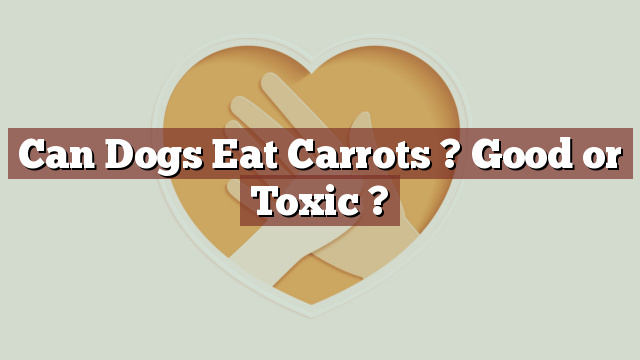Can Dogs Eat Carrots? Good or Toxic?
It is essential for pet owners to be aware of what foods are safe for their furry companions. One common question that arises is whether dogs can eat carrots. So, can dogs eat carrots? Let’s dive into this topic and explore the nutritional value of carrots, their safety, potential risks or benefits, and what to do if your dog consumes them.
Nutritional Value of Carrots: Essential vitamins and minerals for dogs’ health.
Carrots are not only a crunchy and delicious snack for humans, but they also offer several nutritional benefits for dogs. They are an excellent source of essential vitamins and minerals that contribute to a dog’s overall health. Carrots are packed with vitamin A, vitamin K, vitamin C, and various B vitamins. Additionally, they contain minerals such as potassium and fiber, which promote proper digestion.
Can Dogs Eat Carrots? Safety and Toxicity: Expert insights revealed.
Yes, dogs can eat carrots. In fact, carrots are considered safe and non-toxic for dogs. According to experts, carrots are a healthy addition to a dog’s diet when given in moderation. They can be served raw or cooked, but it is crucial to ensure that the carrots are cut into small, bite-sized pieces to prevent choking hazards. However, it is important to note that while carrots are generally safe, some dogs may experience digestive issues if they consume excessive amounts.
Potential Risks or Benefits: Assessing the impact on dogs’ well-being.
Carrots offer several potential benefits for dogs. Firstly, the high fiber content in carrots can aid in maintaining proper bowel movements and preventing constipation. The chewing action required to eat carrots can also help promote dental health by reducing plaque and tartar buildup. Additionally, the vitamins and minerals found in carrots contribute to overall immune system support and promote healthy skin and coat.
While carrots are generally safe, it is important to keep in mind that they should be given in moderation. Feeding large amounts of carrots to your dog can lead to an upset stomach, diarrhea, or even an increase in blood sugar levels. It is always best to introduce any new food gradually and observe your dog’s reaction.
My Dog Ate Carrots: Steps to take if your furry friend consumes them.
If your dog has consumed carrots, there is usually no cause for concern. However, if your dog experiences any adverse reactions such as vomiting, diarrhea, or difficulty breathing, it is essential to seek veterinary advice promptly. In general, it is recommended to monitor your dog’s behavior and bowel movements after they have eaten carrots to ensure there are no unexpected issues.
Conclusion: Dogs can safely enjoy carrots, providing numerous health benefits.
In conclusion, dogs can safely eat carrots and enjoy the numerous health benefits they offer. Carrots are a great source of essential vitamins and minerals that contribute to a dog’s overall well-being. However, it is important to feed carrots in moderation and consider your dog’s individual dietary needs. As always, if you have any concerns or questions regarding your dog’s diet, it is best to consult with a veterinarian for professional guidance. With the proper precautions in place, your furry friend can happily munch on carrots as a healthy and tasty treat.
Thank you for investing your time in exploring [page_title] on Can-Eat.org. Our goal is to provide readers like you with thorough and reliable information about various dietary topics. Each article, including [page_title], stems from diligent research and a passion for understanding the nuances of our food choices. We believe that knowledge is a vital step towards making informed and healthy decisions. However, while "[page_title]" sheds light on its specific topic, it's crucial to remember that everyone's body reacts differently to foods and dietary changes. What might be beneficial for one person could have different effects on another. Before you consider integrating suggestions or insights from "[page_title]" into your diet, it's always wise to consult with a nutritionist or healthcare professional. Their specialized knowledge ensures that you're making choices best suited to your individual health needs. As you navigate [page_title], be mindful of potential allergies, intolerances, or unique dietary requirements you may have. No singular article can capture the vast diversity of human health, and individualized guidance is invaluable. The content provided in [page_title] serves as a general guide. It is not, by any means, a substitute for personalized medical or nutritional advice. Your health should always be the top priority, and professional guidance is the best path forward. In your journey towards a balanced and nutritious lifestyle, we hope that [page_title] serves as a helpful stepping stone. Remember, informed decisions lead to healthier outcomes. Thank you for trusting Can-Eat.org. Continue exploring, learning, and prioritizing your health. Cheers to a well-informed and healthier future!

